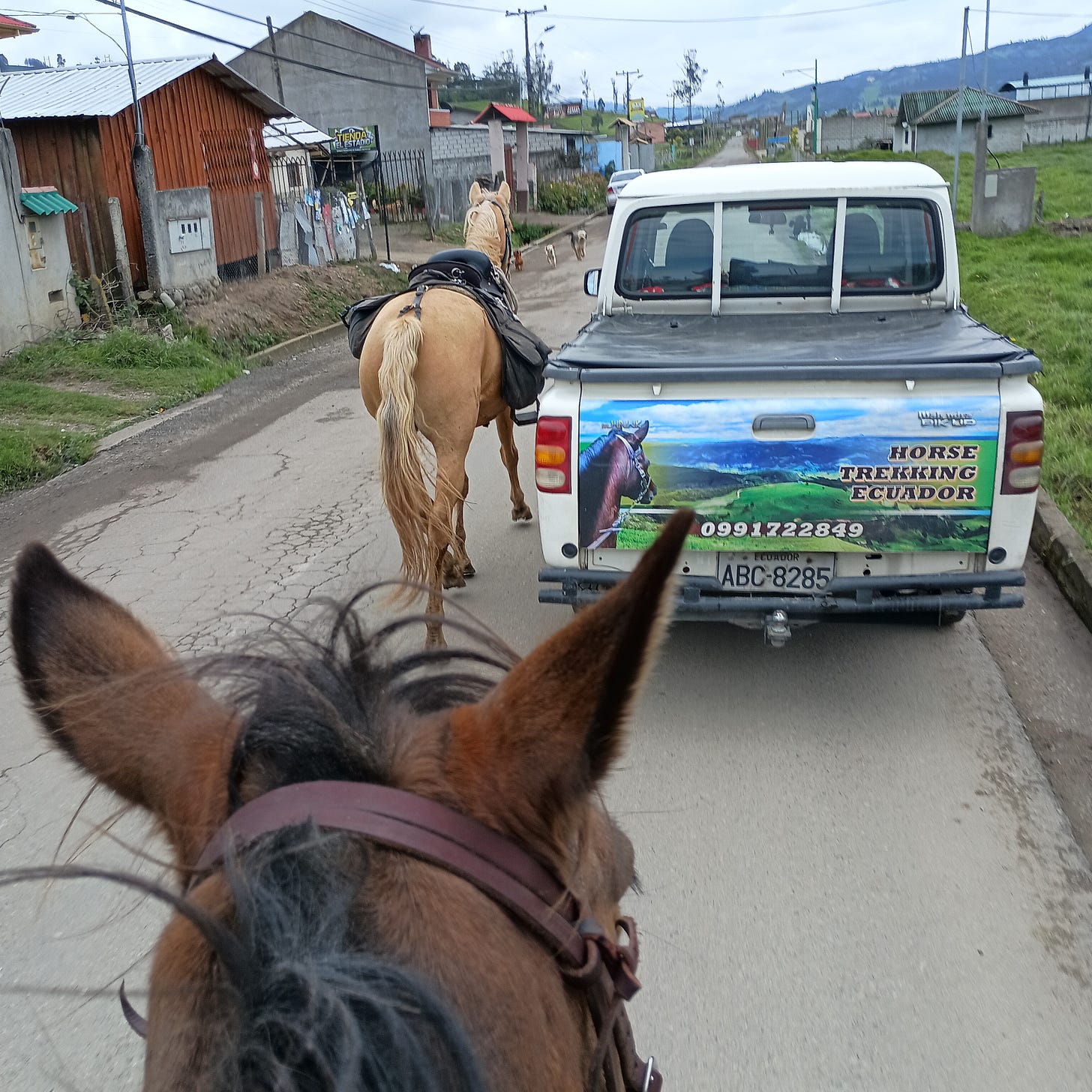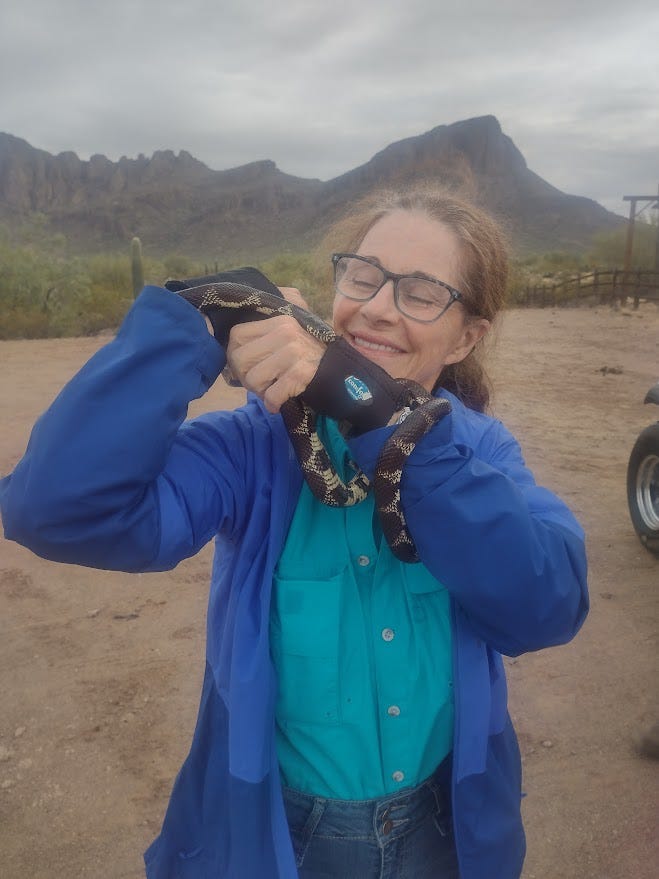The Power and Promise of Neophilia: We're Too Old to Be Stale
Too Old for This Sh*t: How to Take Your Life Back from an Ageist Society

Why novelty is so very good for your aging process
Dear Reader, if you’re anything like me, discovering a new word like neophilia and realizing it applies to you carries a bit of an impact. First, it sounds like a perversion, the kind that gets you arrested in dark alleyways or worse, a little too close to a crypt at night (for the uninitiated, necrophilia).
Truth, it’s terrific to be afflicted. Stay with me here.
I stood on the busy side street, my face stuck to my phone, trying to read the Spanish instructions to order a cab. I had a 2:30 appointment, fifteen minutes to make it, and it was raining.
Try to get a cab in Cuenca, Ecuador, in the rain. It’s impossible.
I was struggling to figure out the bright red error message on my phone. A local expat had shown it to me a few days prior, but way too fast, and without explaining what each word meant. My Spanish is terrible.
However, I’m a neophiliac. I’m loving it, even though it’s frustrating as hell.
Here I am in a gorgeous Latin American city, just had a fabulous lunch with a fascinating person, I’m going to go on a tour, it’s raining, I can’t speak the language and I’m compulsive about being prompt in a culture THAT DOESN’T CARE.
What is not to love about this?
Finally I gave up, grabbed a young man walking towards me. He spoke passable English (it’s taught in the schools here) and showed me that I was standing on the wrong road.
Well, that was helpful. Seconds later I stumbled across a wet tram track and caught the next cab.
All of this is really, really, really, REALLY good for the brain.
In fact it’s one of the ways we keep our grey matter juicy, pliable, and happy.
New stuff, new experiences, engaging with awe.
From Wikipedia:
Neophiles/Neophiliacs have the following basic characteristics:
The ability to adapt rapidly to extreme change.
A distaste or downright loathing of routine.
A desire to experience novelty.
A corresponding and related desire to create novelty
I nearly danced on a tabletop when I read that.
First, it’s a word, while sounding righteously slimy in a sense, which applies perfectly to my nature. It explains why I am not only compulsively peripatetic (as well as pathetic at times) and why I don’t panic when things go to shit.
It also explains why, when things have calmed down and gotten into a rhythm, I swiftly get bored and by god kick the beehive just to liven things up a bit. More on that in another article.
Look, I am subject to catastrophizing like anyone else. However when things whisk sideways, say, on a skydive, and you better react in less than a fraction of a second, you had better damned well be a neophiliac.
I’ve lost my main parachute twice, still here.
Neophiliac.
If my horse takes off at a dead run, out of control scared, I’m the kind who leans forward, grabs the rein at the mouth and pulls him into a circle, then a stop.
Happened on a ride in Croatia, way up in the high country. Still here.
Neophiliac.
I don’t panic. In fact, Despite the fact that I might want to change my shorts later, those are the very conditions in which I thrive, because I’m made for them. Some of my closest friends are too.
Might have just figured out why I’ve been single most of my life. If you like calm and predictable I am NOT your girl. I don’t need saving; if anything I end up picking up the pieces of those around me who collapse in the face of a shitshow.
It’s probably why I so love Lt Ripley in Aliens.
For those of you who, like me, when pushed hard we thrive when things go sideways, there’s our word: Neophiliac.
That does not mean, not at all, that we’re not scared or worried. When those we love are involved and affected, when people we care about are at risk, you betcha we’re worried.
If anything, for those I know who are like me in this way, it makes us vastly more responsible for and protective of those who do not cope with such pressures.
Hence, Ripley.
Something in us loves that challenge. Above all we crave the new. It makes us feel vital and vibrantly alive.
Why is this good news?
The benefits to our brains as we age don’t depend on the extremity of the experience, only that we introduce new things to ourselves.
You and I don’t need to be neophiliacs to get our brains going. Where I might want to go try a really challenging new sport (assuming my body can handle it), you might try painting. Poetry. Walking in the woods, as fellow Stacker
loves to do.Nature is among the best of all experiences because no walk is identical. Nature teaches us to notice.

Learning to notice teaches our brain to stay lively. Walking keeps us healthy. That’s a fine combination, something my friend
and his wife do every single day with rare exception.This article from Mindful Neuropsychological Services, PC goes into some lovely detail about all the things that calmer, saner people can do to invite their brains to engage.
Far from needing to take on the kinds of challenges that I live for, such as hiking Kilimanjaro or Mt. Kenya or kayaking the Arctic Ocean, you can do so very many things on the other end of the scale.
From artistic hobbies to travel, even just a local excursion to see the sights nearby, such activities fill our brains with pleasurable dopamine. They allow us to appreciate so many awe-inspiring moments that we miss entirely when settled into our armchairs or umbilically attached to our phones.
Most especially, those activities which involve physical as well as social engagement are the best. Our brains are getting “fed” in every possible way: we make friends, have fun, are invited to think, explore new things and expand our worlds.
Here in Cuenca there’s a large ex-pat community. I’ve been meeting people who recently moved as well as those who’ve lived here a long time. Those who have done well have learned the language, the customs, and developed a sense of humor about cultural differences that are continued irritations to those who demand that Ecuador be mini-America.
Those folks don’t last here. That rigidity causes them to return after two to five years. Perfectly understandable, and that’s not a criticism. This kind of extreme daily demand to adapt is simply not for everyone.
But it sure is good for your brain.
In fact, in my conversations with those here more than five years, it’s clear that their delight is in the challenges.. They thrive on the demands to pivot when rules change in mid-negotiation or mid-sentence, when language differences result in hilarity are precisely what keep them youthful and happy here.
Doesn’t mean they don’t get irritated. They just learn to adapt. The brain loves a challenge.
It never occurred to me during all the years I’ve been doing extreme sports beginning around 2011 that those choices would keep my brain youthful. The challenging sports, the training, the travel, the constant demand to adjust to new cultures, the frustrations of new languages- all those and much more were a boon for my noggin.
Every time I mount a new horse and don’t know what to expect, every time I hike a new mountain, every time I try hard to remember my terrible inadequate Spanish, I am exercising my grey matter.
You can do this, too. Even if you’re housebound or disabled, you can challenge your brain with all kinds of exercises, conversations and puzzles. A really challenging debate is a perfect example. A chess game.
The point is to explore. Your brain will love you for it, and reward you with clarity, youthful energy and joy. It’s a muscle like any other.
Why bother?
This: the next time you find yourself immensely frustrated that things aren’t going your way, you learn to see it as a plot twist.
It’s something novel in the novel that you’re living right here, right now.
You’re worth it.
Let’s play.

I hope you enjoyed this article. Please kindly consider supporting my work so that I can do more of it, and above all, find reasons to go play.





Neophilia- I like it! The trouble is when you’re addicted to an adrenaline rush , a ‘normal’ day makes me feel anxious.
Given my hearth-hugging tendencies, it's a damn good thing I don't have to fling myself out of perfectly good airplanes in order to stimulate my brain or it would have turned to cement by now. But your point on embracing novelty and avoiding the error of thinking the world, or your life, or anything else is supposed to be the way you expect it to be is well taken. And I have to ask: WHO is riding the horse in front of Samurai -- or is he the pace horse for the truck??